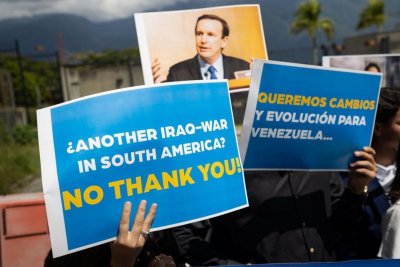
A group of Venezuelans hold signs against U.S. military intervention during a protest outside the U.S. Embassy in Caracas, Venezuela, on October 27. The embassy has been closed since 2019, when Nicolas Maduro announced the break of diplomatic relations with the United States. File Photo by Ronald Rena/EPA
Nov. 12 (UPI) — President Nicolás Maduro announced activation of a “higher phase” of the Independence Plan 200, a program of joint civilian-military exercises designed to test Venezuela’s ability to respond to external threats.
The deployment includes the Bolivarian National Armed Forces, or FANB, the Bolivarian Militia and police units across all states, with a focus on Apure, Cojedes, Carabobo and the capital region, TeleSURTV reported.
The measure, announced Tuesday by Defense Minister Vladimir Padrino, aims to “strengthen territorial defense and enhance operational readiness” amid rising geopolitical tensions in the Caribbean.
Activation of this “higher phase” coincides with the arrival of the aircraft carrier USS Gerald R. Ford in the region under the U.S. Southern Command.
The U.S. Department of Defense said the deployment is part of an operation aimed at “disrupting narcotics trafficking and dismantling transnational criminal organizations” operating in the region. However, the Venezuelan government has interpreted the move as a “provocation.”
According to Venezuela’s Defense Ministry, the new stage of the Independence Plan 200 includes command, control and communications exercises, along with simultaneous air, land, naval and river operations, the newspaper Ámbito reported.
The government described it as an “advanced phase” of the plan launched in September, aimed at ensuring “active resistance and permanent defense” against what it calls pressure and maneuvers by the United States.
Alongside the heightened military alert, the government enacted the Law of the Command for the Comprehensive Defense of the Nation, approved days earlier by the National Assembly.
The law establishes a network of comprehensive defense commands at the national, regional and municipal levels to coordinate the armed forces, civilian institutions and citizens in the “protection of sovereignty and peace.”
Maduro signed the law at the Miraflores Palace on Wednesday, invoking Article 326 of the Constitution, which defines the people’s shared responsibility in national defense. The president said he was prepared to confront any threat and ordered the immediate creation of the new commands.
“The order must be activated so that the comprehensive defense commands are established, structured and begin their work, to be prepared, if we as a republic and as a people are called to take up armed struggle to defend this sacred legacy of the liberators, to be ready to win, to triumph through patriotism and courage,” Maduro said, according to a report by NTN24.
These groups will be led by the Strategic Operational Command of the Armed Forces, which will oversee the integration, planning, coordination, supervision and control of the country’s defense organizations in support of military operations nationwide.
The government sees the legislation as a step toward strengthening its civilian-military defense doctrine, while analysts and opposition figures warn it could expand the militarization of the country and the political role of the armed forces.